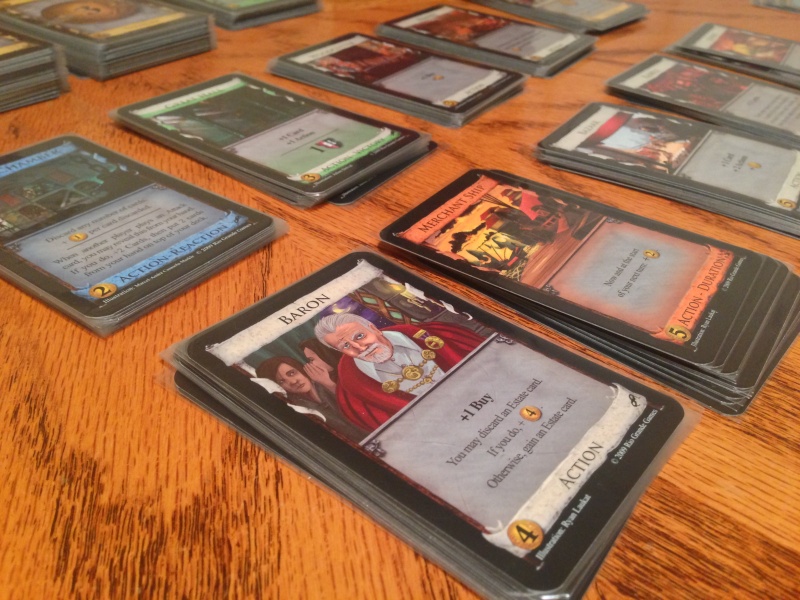 Mindclash Games is known for its heavy Euro entries, like Anachrony and Trickerion, which are among my all-time favorite games. Recently, though, the publisher dipped its toes into lighter gaming with Astra, published under the newly created Mindclash Play sub-brand. These games are meant to offer Mindclash’s signature depth of theme and strategic play in a smaller, more accessible package. We know they can do complex games well, but how do they handle game experiences geared more towards casual gamers?
Mindclash Games is known for its heavy Euro entries, like Anachrony and Trickerion, which are among my all-time favorite games. Recently, though, the publisher dipped its toes into lighter gaming with Astra, published under the newly created Mindclash Play sub-brand. These games are meant to offer Mindclash’s signature depth of theme and strategic play in a smaller, more accessible package. We know they can do complex games well, but how do they handle game experiences geared more towards casual gamers?
Astra is an astronomy-inspired, midweight strategy game from Mindclash Play designed by Patrik Porkoláb and Frigyes Schőberl with Eszter Krisztina Sas for 2-5 players that plays in about 45-60 minutes.
Gameplay Overview:
Astra’s gameplay is straightforward, making it easy to teach and get into quickly. A player turn is broken into 3 phases: the optional Ability phase, the Action phase, and the Discovery phase. Once you’ve claimed discovered constellations, you can begin your turn by using any of your unexhausted Constellation cards. These abilities will provide resources like extra Stardust and Telescopes, or they’ll allow you to perform useful special actions like marking stars or increasing your Wisdom or Pouch size.
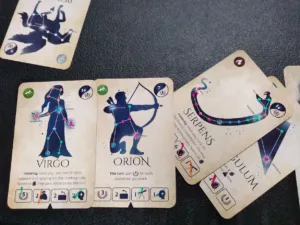
The Action phase is where most of the gameplay occurs; you can either Observe or Rest. Observing allows you to mark stars on the available Constellation cards by spending Stardust. You generally must mark a star adjacent to the one you just marked, which usually prohibits a player from completing an entire constellation on their own in a single turn. So, you’ll need to decide where and when to strike in order to ensure that you are the one to complete a Constellation card if you really need it. Telescopes can be spent if you want to take extra Observe actions on the same turn, which opens up the door for marking stars on multiple constellations at once. When you’ve run out of Stardust, you will have to take a Rest action instead, refilling your Pouch with Stardust and reactivating any exhausted constellations you have that match the element type depicted on the Sphere board.
The Discovery phase occurs if all stars on a Constellation card are marked at the end of a player’s turn. That player discovers the constellation and takes it into their tableau, making its ability available to use on a later turn. Any other players who have marked stars on the constellation may pick a boon depicted on the card, which will provide resources, increase Pouch size or Wisdom, or even grant Fame points.
As constellations are discovered, they are replaced with cards from the Draw deck. Once the Game End card is revealed, the endgame is triggered, the last few rounds are played, and then scores are tallied. As usual, the player with the highest score wins.
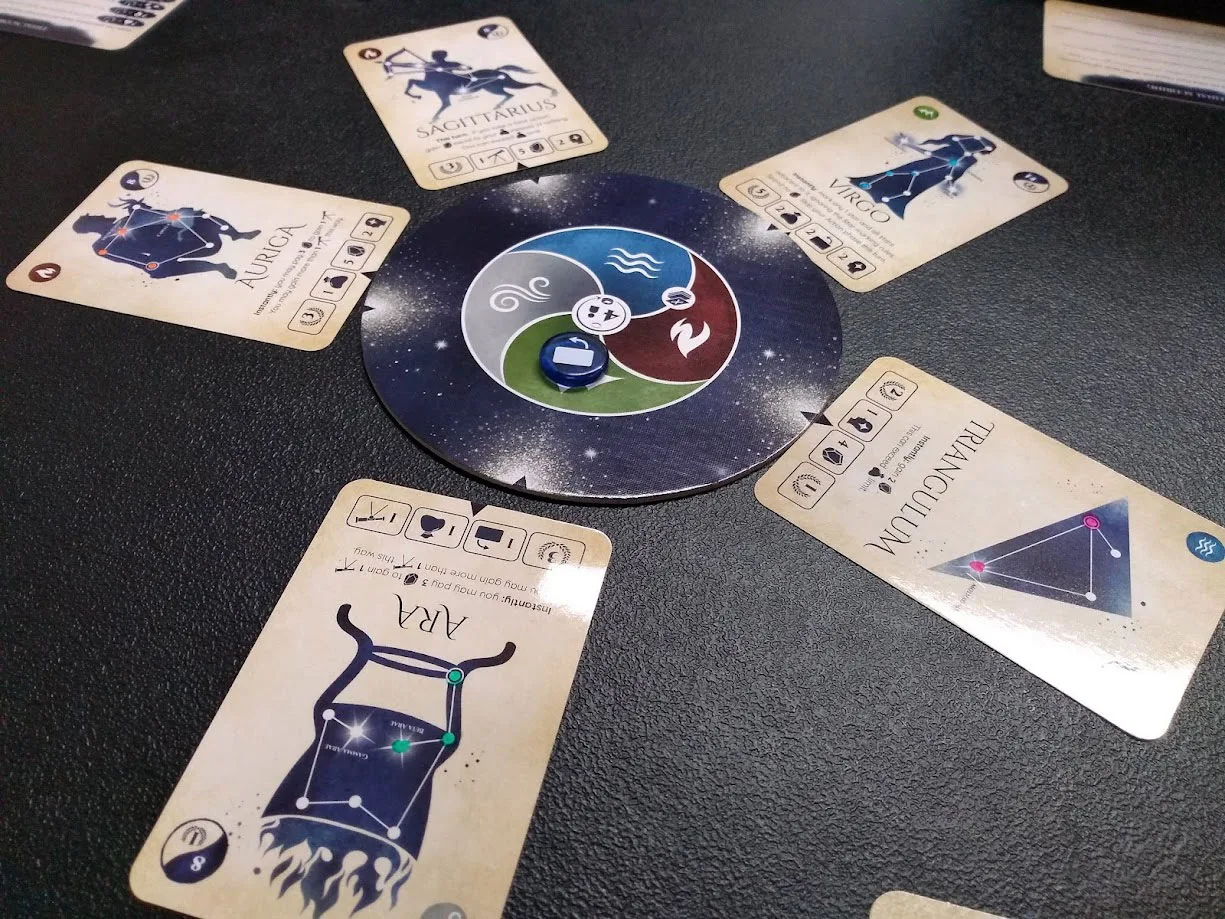
Game Experience:
While not a complex game, Astra rewards players who can balance both tactical and strategic gameplay. A significant source of Fame is the Final Scoring card, which begins with a few Elements marked off, providing a direction to follow throughout the game. For each element you manage to max out on (4 markings), you’ll receive 11 points. So your long-term strategy is likely to focus on collecting the appropriate elements to maximize your score.
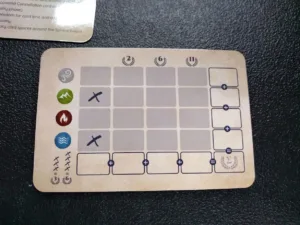
However, the game is filled with many smaller, in-the-moment decisions to make. Do you push hard to discover constellations and add those cards to your tableau, gaining abilities and bumping your scoring potential? Or do you make sure to spread your contributions across multiple constellations and ensure that you’ll benefit from the boons just by marking off a few stars without planning to win the cards outright? You’ll need to do a bit of both, but determining when to dabble and when to pounce is part of the challenge of the game. You will often be responding to the actions of your opponents as well. When one of them serves up a juicy Constellation card to be discovered for just a couple of Stardust, it’s crazy not to take advantage, right?
The Constellation cards initially appear to offer up powerful abilities that can help you turn the tide of the game, but in reality, it’s not all that easy to trigger and benefit from them regularly. Once a card has been used and exhausted, you’ll usually need to wait until a Rest action to reactivate it. However, taking that Rest action means you’re not marking stars during a turn, which can be a pretty underwhelming turn at best and detrimental to your plans at worst. Plus, you have little control over which element is active on the Sphere board, so you can’t count on things lining up so that you’re ready to rest at the right time to reactivate the Constellation cards you want to.
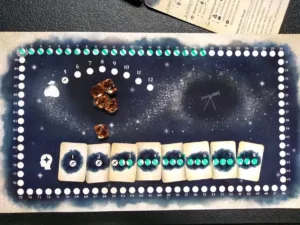
Chances are that an opponent will rest on their turn, causing the sphere to rotate and tanking your timing plans. This lack of agency can throw a wrench into your works near the endgame as well, because gaining points from a Constellation card’s printed value depends on it being unexhausted when scoring. There are also several card abilities that benefit from triggering on a turn when a specific element is showing on the Sphere. Good luck lining that up effectively.
It actually might pay to focus one’s efforts on taking card abilities and boons that just straight up provide Fame points. Marking a few stars on every card in order to ensure that you’ll be able to regularly gain points from boons can really pay off in the long run. And if your Final Scoring card pushes you to focus on discovering constellations that produce Fame when triggered, all the better. However, this kind of synergy is just as often about luck of the draw, with the random Final Scoring card distribution and which constellations end up coming out, as it is due to stellar strategic gameplay.
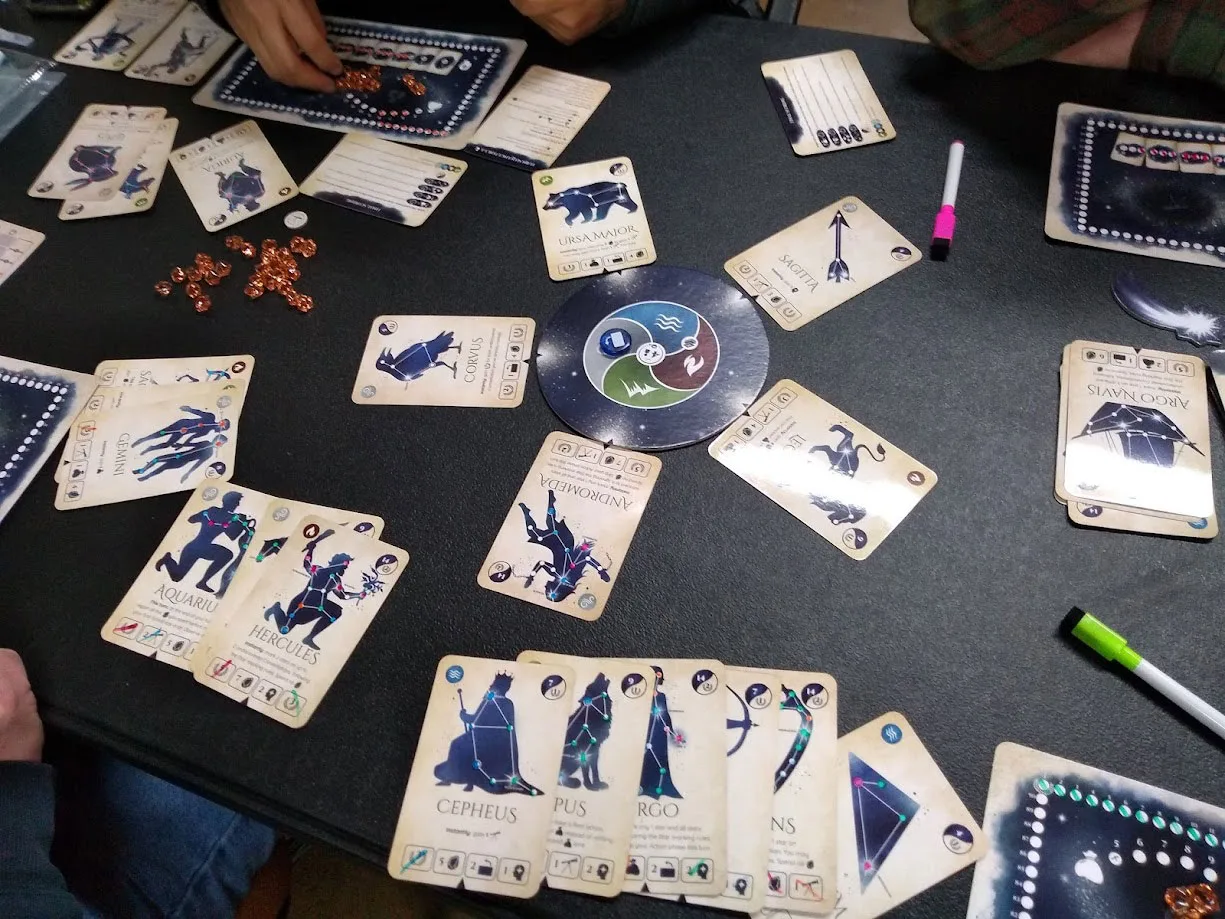
Final Thoughts:
Mindclash has undoubtedly figured out how to make good, complex thematic games that take hours to play, provide a wealth of variety, and feature crunchy decision-making opportunities. Since this is their area of expertise, and they do it quite well, I’ll admit that I was a little surprised to see them venture into shallower waters with a game like Astra. While it’s not a bad game at all, I found it to be a little underwhelming in comparison to their weightier fare.
It feels like there are a lot of illusory elements at play in Astra: the illusion that Constellation card abilities are cool and useful, the illusion that you can time things just right so that your abilities and scoring opportunities will pan out to your benefit. However, it is generally satisfying making those immediate decisions on which stars to mark and whether to keep pushing on a single constellation or to spend Telescopes instead to spread your involvement out among the stars. And the theme itself is quite appealing and uncommon.
If you are a fan of Mindclash’s work, I wouldn’t advise going into this one expecting to get the same enjoyment you’re used to. But, overall, it’s a lighter gaming experience that’s probably worth investigating, particularly if the theme speaks to you.
Final Score: 3 Stars – Lacks the weighty greatness that Mindclash is known for, but has an interesting theme and provides some satisfying mechanisms, especially for a casual game night.
 Hits:
Hits:
• Unique and interesting theme
• Easy to learn and plays quickly
• In-the-moment star placement choices are fun to make
Misses:
• Cool abilities and player agency are illusions
• Much of the gameplay feels hollow
• Doesn’t compare well to other Mindclash games







